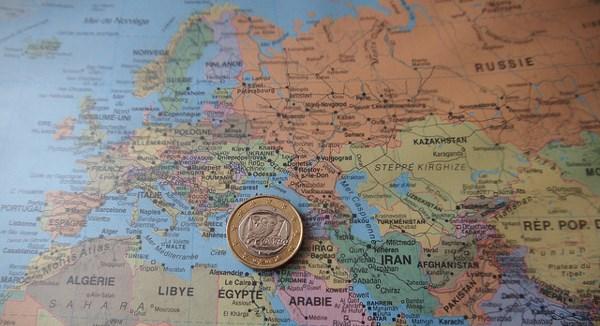The economic complexities of the Greek crisis have attracted a lot of coverage in recent weeks, but it’s important to hold the financial detail alongside concern for the common good, says Patrick Riordan SJ. ‘The principles of solidarity, subsidiarity and the common good are helpful guides to appreciating the obligations on actors to behave responsibly in very complex situations.’
What can the notion of common good contribute to our understanding of the long drawn out Greek crisis? Does the crisis reveal the bankruptcy of the rhetoric of solidarity in the European Union? Is the renowned principle of subsidiarity exposed as hollow, given the reluctance of the European institutions to come to the aid of Greece? These concepts of solidarity, subsidiarity and the common good are part of the language of the European Union but also have their place in the tradition of Catholic Social Thought.
A remark by Pope Benedict in his 2009 encyclical letter Caritas in Veritate almost seems prophetic in relation to the Greek situation. Pope Benedict writes: ‘The principle of subsidiarity must remain closely linked to the principle of solidarity and vice versa, since the former without the latter gives way to social privatism, while the latter without the former gives way to paternalist social assistance that is demeaning to those in need’.[1] I suppose by ‘social privatism’ the pope means the attitude which says that everyone should be left alone to mind their own business, and by its opposite, ‘paternalistic social assistance’, he means the tendency to act on the assumption that one knows what is best for others. He made this statement in the context of his reflection on international development aid in order to stress that the two important values of subsidiarity and solidarity are both to be respected, that disregard of one in favour of the other can lead to distorting or objectionable outcomes. Development aid goes beyond disaster relief and the provision of what is immediately and desperately needed in terms of clean water, food, shelter and protection from disease; it also looks towards the future in the spirit of building infrastructure and systems to ensure the regular availability of life-sustaining and life-enhancing goods and services. Whether it be economic development, the creation of health and education systems, or the facilitation of good governance, such aid is not focused on immediate need but on longer-term prospects for a society. It is in such circumstances that Pope Benedict stressed the linkage of solidarity and subsidiarity.
Solidarity is what binds donors and beneficiaries in a sense of a common humanity with its typical vulnerabilities so that the plight of those in need of development is recognised by their benefactors with a sense of compassion. Subsidiarity is rooted in respect for the autonomy of those in need of assistance so that whatever aid is given does not deprive people of the capacity to provide for themselves. The two values must be linked in whatever policy of development aid is pursued. Respect for the autonomy and responsibility of individuals and groups might result in their being left to fend for themselves, unless that respect is balanced by a real concern for their welfare. On the other hand, the pope warns that concern for the welfare of others can become a form of paternalism, if it is not balanced by respect for their own responsibility to provide for themselves according to their own estimation of their needs. Hence the emphasis on pairing the two principles.
The present Greek situation is not exactly one of a society in need of international development aid but rather of a member state of the European Union seeking assistance in dealing with its sovereign debt. But the similarities are such that the same tension between solidarity and subsidiarity applies, hence the suggestion that the pope was prophetic. As has happened in other EU states, the policies adopted to deal with the debt crisis have led to significant cutbacks in state expenditure on welfare provision, employment, wages and pensions, and many have experienced hardship as a result of this austerity. Compassion for the sufferings of those hardest hit is an expression of solidarity and many media reports question why this bond of compassion does not translate into effective policies to give Greece what it needs.
The other side of the story is that the institutions of the EU, along with the International Monetary Fund (IMF), have already been helping Greece by writing off some debt and rescheduling repayments, and in sustaining the liquidity of Greek banks. The recent agreement (July 2015) arranged for the third bailout package since May 2010. However, such assistance is of little value in the long-term unless the Greek authorities address the root causes of the problem. Subsidiarity as a principle insists that assistance should not replace the efforts of recipients themselves to address their problems and find solutions. It entails a willingness to help, with an expectation that those being helped take responsibility to find and implement their own solutions to their problems. The tension between the two values is evident: the insistence that the Greek government come up with structural reforms in order to qualify for assistance can appear as a denial of solidarity with those who are suffering; on the other hand, a continuing provision of aid to support people’s welfare, motivated by compassion, can appear as paternalistic and a denial of respect of the autonomy of the recipients. Hence the pope’s telling remark: ‘The principle of subsidiarity must remain closely linked to the principle of solidarity and vice versa’.
The Greek sovereign debt is different from that of other European countries which found themselves in trouble following the banking crisis of 2009. Ireland, Spain and Portugal, and Italy to a lesser extent, were badly affected by the threatened collapse of banks which were vulnerable following the bursting of the property bubble triggered by the subprime mortgage fiasco in the United States. It should not be forgotten that the UK is still feeling the effects of the decision to rescue the British banks. In the case of Ireland, the state undertook to guarantee the loans of banks (including German and French institutions) especially to property speculators. With the highly inflated prices paid for property, the crash left the banks holding overpriced assets as collateral. The government had to borrow to deliver on its guarantee, but eventually the markets expressed doubt that the country would be able to repay those debts. At this point support was provided by the IMF and EU institutions. The Greek situation is very different. Its sovereign debt was not occasioned by the banking crisis of 2009, but by the practice of Greek governments since the accession to the EU to finance their budgets by borrowing, taking advantage of the low cost of money on international markets. This is the reason why ‘structural reform’ is so much part of the negotiations. Further loans to Greece can have little or no prospect of repayment as long as the country functions as heretofore, being financed by borrowing for which there is no comparable generation of wealth. With low productivity levels, the economy has little capacity for the required recovery.
There is a deeper structural problem in Greece, rooted in the divisions in the country since the Second World War. The civil war of the late 1940s saw the country divided between left and right and it is questionable whether the political settlement has ever facilitated true cooperation between the two sections of the population in order to maintain an economy and political institutions for the sake of a common good. The absence of a well-structured and efficient taxation system suggests that there has never been the political will on the part of the wealthy section of society to bear an appropriate share of the costs of maintaining the country’s health and welfare systems, as well as the other drains on government expenditure. Similarly the systematic failure of governments to pursue those who evade paying tax suggests the preference to steer away from provoking the kind of conflict which earlier had torn the country apart. So governments have resorted to borrowing to finance the ordinary expenditure on services. The structural reform which is necessary to remedy this defect in the political structure is more profound than might be satisfied by changes in the taxation system or in welfare benefits. The common good of the Greek polity places enormous demands on its leaders, but also on its citizens. The absence of commitment to a common good, evident in the causes of the problem, may reflect a lack of solidarity within Greek society itself and may also militate against the viability of a solution.
How are we to understand the common good in the context of the Greek debt crisis? The notion of the common good is related to the concepts of solidarity and subsidiarity. In his encyclical On Social Concern (1987), Pope John Paul II writes that solidarity ‘is not a feeling of vague compassion or shallow distress at the misfortunes of so many people, both near and far. On the contrary, it is a firm and persevering determination to commit oneself to the common good; that is to say to the good of all and of each individual, because we are all really responsible for all’.[2] In summary we can say that the common good comprises the total set of conditions which enable individuals and groups to flourish.[3] That flourishing is spoken of elsewhere as the integral fulfilment of every person and of the whole person.[4] So considered, such a broad scope of the common good exceeds the competence of any political authority. The Greek political leaders have primary responsibility for the welfare of their own people; the EU leaders and officials including the representatives of the European Central Bank have responsibility for the flourishing of the European Union and the smaller set of members of the eurozone; while the IMF belongs among the set of Bretton Woods institutions created to assist member countries facing economic or financial difficulties. At each level the significant players are charged with responsibility for the appropriate common good, and we should not be surprised if there is tension between the levels. Also, care for the common good at each level involves not merely consideration of the plight of individuals but primarily also responsibility for maintaining and operating the institutions which qualify among the conditions for human fulfilment. So for instance the IMF officials are charged with upholding the established system for assisting countries in financial difficulty. It may be a flawed system and may need to be reviewed, but such repair cannot be conducted in the midst of actual crises. Applying the rules fairly involves care to avoid moral hazard, namely the danger of encouraging irresponsible behaviour with assurances there will always be a rescue from the consequences of ill-guided policies. The IMF officials will see the common good of the international community, which they are obliged to serve, as requiring adherence to the set rules and procedures.
Similarly, leaders and officials of EU institutions and countries have a view to the common good of the Union and of the eurozone. Their responsibilities include the care not to weaken or undermine the institutions which are deemed to be valuable conditions for the flourishing of all. Many of those institutions are democratic in some measure, even if the concern for the democratic deficit of the EU institutions is well-known. The point here is that while the Greek leaders have a democratic mandate from their electorate to resist further austerity measures, their partners equally have democratic mandates to which they will have to answer.
Mr Tsipras and the Greek leaders must exercise their responsibility for the common good of their country and its people, as well as respecting the common good of the Union to which they belong. Their arguments are plausible, that more cutbacks in government spending and other austerity measures will jeopardise further the capacity of the economy to recover and return to the level of performance which could enable Greece to pay off its debts eventually. Reviving the economy and returning the country to a level of confidence such that capital flight will cease and investment will take place is a priority. But Mr Tsipras is caught in a dilemma of his own making. His democratic mandate is not only to resist austerity, but also to retain the Euro as the national currency. The outcome of the recent agreement is that it has not proved possible to do both. He has had to accept more austerity measures as the price to be paid for remaining in the eurozone. Did he and his team make the correct decision for the sake of the common good? As Pope Benedict warns us, we must be careful at this point to avoid paternalistic usurpation of the responsibility of the Greek leaders and people to decide for themselves how they will manage the crisis.
A useful lesson might be provided by the UK experience in relation to the ERM, the European Exchange Rate Mechanism. Introduced in 1979 it was intended to facilitate trade within the European Community by setting standardised exchange rate bands between the different currencies of the countries which then made up the Community. The UK with its Pound Sterling joined the ERM in 1990, but two years later found that the Pound was vulnerable to speculation as the government struggled to maintain the declared value of Sterling within the ERM. The Bank of England spent over £6bn to save the Pound but finally conceded and withdrew Sterling from the Mechanism. While the day of the crash in September 1992 became known as Black Wednesday, with hindsight the decision can be viewed not so much as a failure but as a positive step towards facilitating economic recovery.
Devaluation is an important tool available to countries with their own currencies, but members of the eurozone lack this facility. Would the Greek economy be better off and its common good better served by returning to the Drachma? Such a return would inevitably involve a devaluation, but that would generate a boost for the economy in encouraging exports, and inviting tourism, with consequent earnings of foreign currency.
The principles of solidarity, subsidiarity and the common good are helpful guides to appreciating the obligations on actors to behave responsibly in very complex situations. The responsibility to act requires prudential judgments by leaders, officers and representatives, and there is no simple calculus available to identify the correct judgment or the right decision. Pope Benedict means it seriously when he writes of the difficulty of combining solidarity and subsidiarity.
Patrick Riordan SJ is a member of the Heythrop Institute: Religion and Society.
[1] http://w2.vatican.va/content/benedict-xvi/en/encyclicals/documents/hf_ben-xvi_enc_20090629_caritas-in-veritate.html §58, emphasis in original. Accessed 20 July, 2015.
[2] http://w2.vatican.va/content/john-paul-ii/en/encyclicals/documents/hf_jp-ii_enc_30121987_sollicitudo-rei-socialis.html, §38, accessed 20 July, 2015.
[3] http://www.vatican.va/archive/hist_councils/ii_vatican_council/documents/vat-ii_cons_19651207_gaudium-et-spes_en.html, §26, accessed 20 July, 2015.
[4] http://w2.vatican.va/content/paul-vi/en/encyclicals/documents/hf_p-vi_enc_26031967_populorum.html §14.






